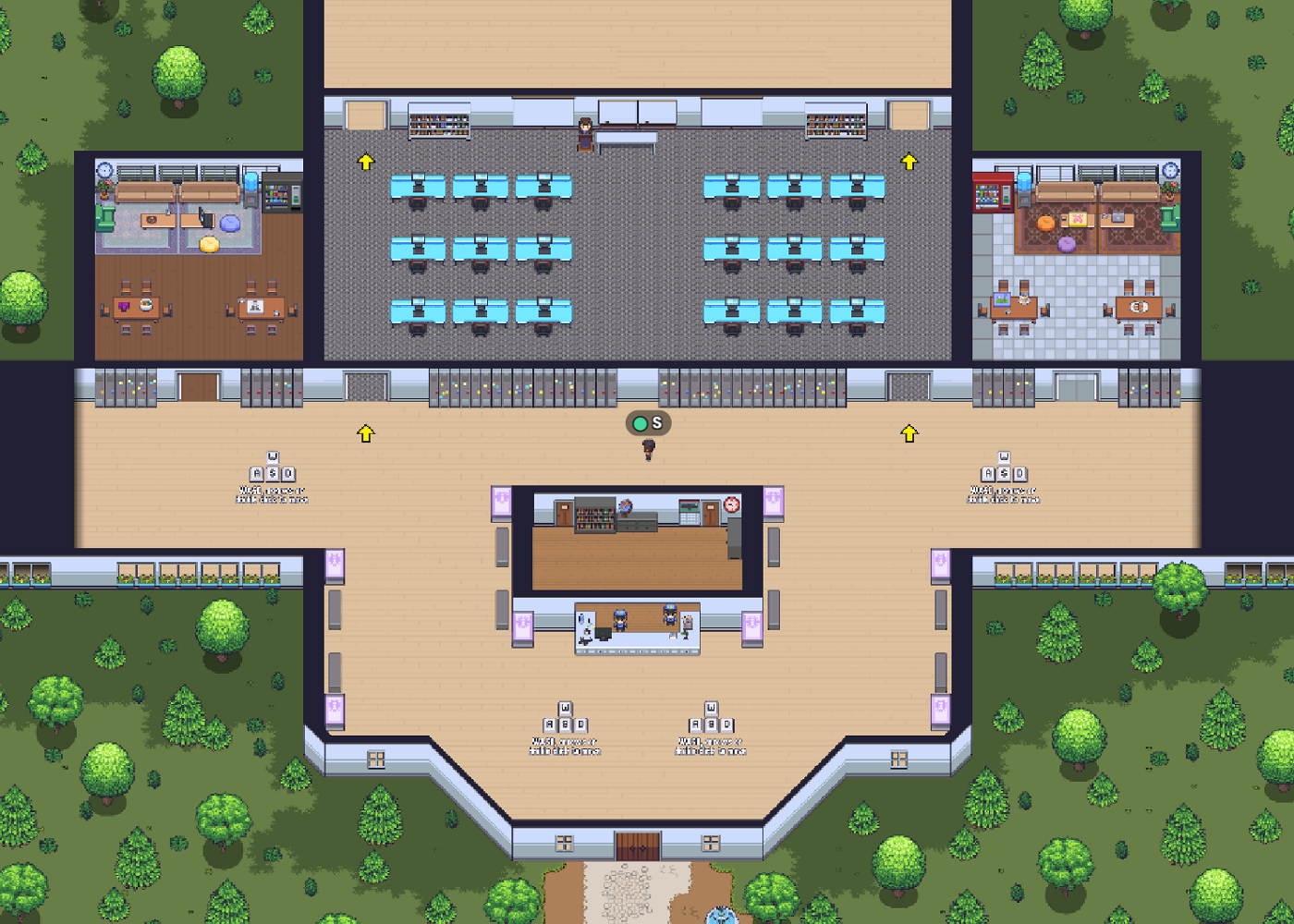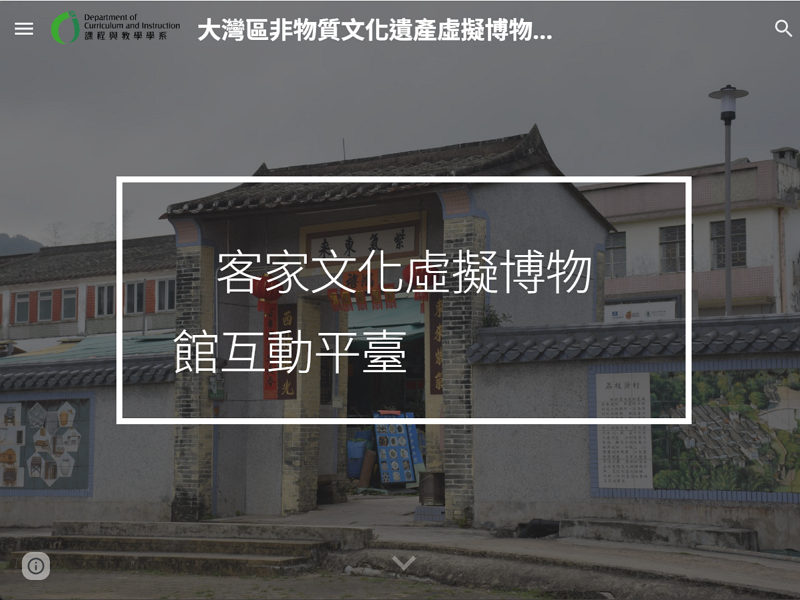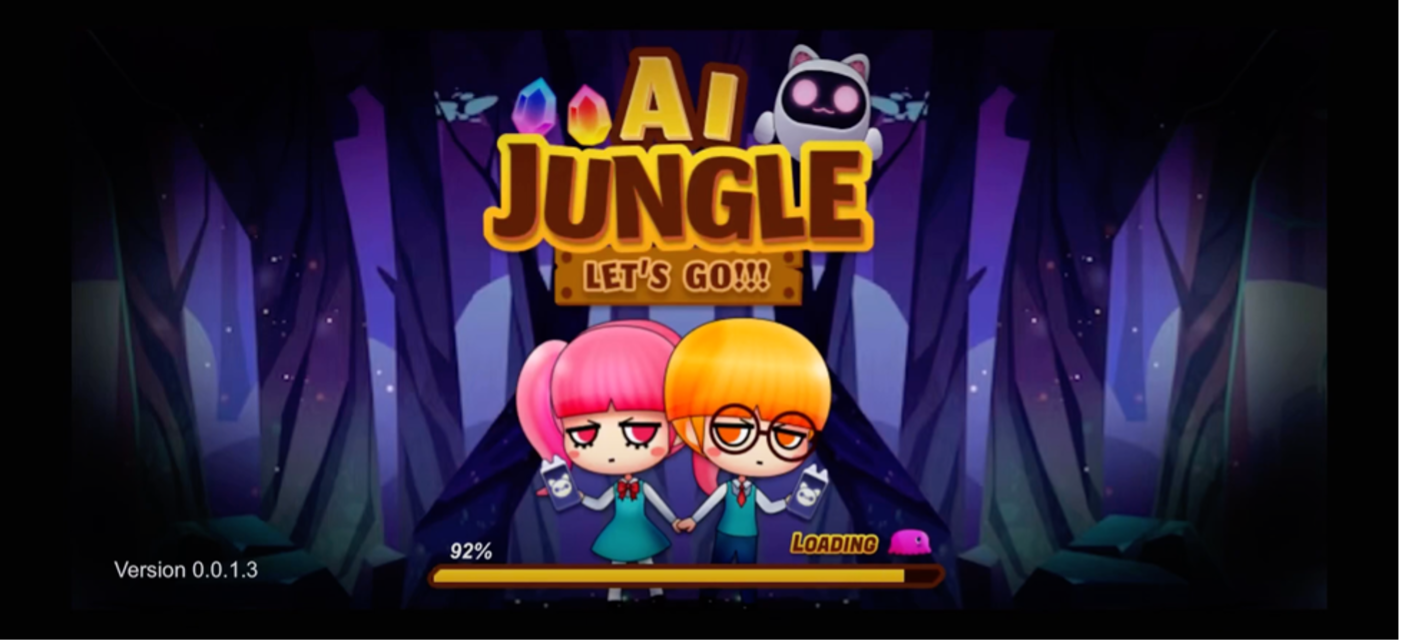Dr HO Chun Sing Maxwell
Jun 2024 – May 2026
Quality Education Fund
Values education plays a crucial role in cultivating students' positive values and attitudes, such as perseverance, responsibility, national identity, and care for others, while fostering a harmonious school environment. By integrating entrepreneurial spirit and a sense of belonging to the Greater Bay Area (GBA), this project aims to comprehensively enhance students' creativity, character, and sense of identity, preparing them to address the challenges of a rapidly changing world. Specifically, the objectives of the project are:
With these objectives in mind, the project has designed, developed, and implemented:
Dr BA Shen
Apr 2024 – Jun 2025
Central Reserve Allocation Committee
Collaborative inquiry is a widely adopted learning approach in higher education, where students work together to solve problems and build knowledge through sustained communication. However, as class sizes grew, instructors faced challenges in efficiently assessing collaborative inquiries and providing timely, effective feedback due to the large volume of discourse data generated. This project addressed these issues by developing an AI-powered analytical module designed to assist instructors in formative assessment and feedback.
Grounded in the community of inquiry (CoI) model, the module automatically processed discourse data, modeled student inquiry patterns, and generated visualisations and explanations to support instructors’ decision-making. During the project, the module benefited over 100 undergraduate and graduate students enrolled in inquiry-based courses. Additionally, over 30 staff members gained insights through dissemination activities such as research seminars.
Quasi-experiments were conducted to explore the impact of AI-assisted assessment on students’ inquiry behavioral patterns and perceived feedback effectiveness. In the long term, the project aimed to extend the module’s use across internal and external inquiry-based courses, enhancing problem-solving and critical thinking skills while integrating AI into teaching and learning processes.
Dr KEUNG Pui Chi Chrysa
Apr 2024 – Jun 2025
Central Reserve Allocation Committee
The project aims to facilitate university students’ understanding of the ethical challenges/ issues related to the digitalisation of teaching and learning. It also strives to develop university students' ethical roles and responsibilities by addressing the underlying ethical considerations and principles in various situations. As part of this initiative, a virtual learning platform has been developed for university students, featuring simulated scenarios, interactive tasks, and feedback on responses.
Dr FONG Wai Tsz Ricci, Dr CHENG Wing Yi Rebecca
Jan 2024 – Dec 2025
Fund for Innovative Technology-in-Education
Recent technological advancements have led to the rise of generative AI (GenAI) tools. While having the potential to induce critical and reflective thinking, GenAI tools also threaten the authenticity of students’ work if they are used inappropriately. Adding to the challenge, course lecturers may lack the professional capacity to implement GenAI tools effectively in their courses. This initiative aims to promote the effective and ethical use of GenAI tools among students using the framework of 6-P pedagogy, a 6-step approach to guide students in using GenAI tools effectively. Specifically, the objectives of the project are:
With the objectives in mind, the project will develop professional development and learning materials for teachers and students, including:


Dr CHEUNG Sum Kwing, Dr FONG Wai Tsz Ricci, Prof YEUNG Siu Sze
Jan 2024 – Dec 2025
Fund for Innovative Technology-in-Education
Due to the limited opportunities for students from the BA(SE), BEd(ECE) and BSoSc(PSY) programmes to communicate and interact with learners with special educational needs, students may face difficulties in acquiring practical skills and experiences required to effectively support learners with disabilities and diverse learning needs. To address the situation, this initiative aims to equip students with the necessary skills by constructing a Special Education Metaverse to provide an immersive learning environment with learning activities simulating real-life scenarios. Specifically, the objectives of the initiative are:
With the objectives in mind, the project will design and develop:

Dr YUNG Wai Ho Kevin; Dr ZHANG Yuefeng Ellen
Jan 2024 – Dec 2024
Teaching Development Grant
This project aims to develop a pedagogical framework to enhance university students’ academic literacy in reading and writing regarding their critical and ethical use of AI in source-based academic writing. Since AI technology has been developing rapidly, it is crucial to explore its usage among university students and teachers before developing a protocol for its critical and ethical use or measuring or experimenting its effectiveness. In this regard, the project will first explore the usage of AI tools among university students, focusing on their academic literacy. Specifically, the project will investigate the extent to which and how university students use AI to comprehend, analyse, and synthesise ideas from complex academic texts and support their arguments in writing. The project will identify effective AI tools and features, develop pedagogical approaches and teaching packages, and provide recommendations for the critical and ethical use of AI in academic writing.
Dr YEUNG Siu Sze, Dr CHEUNG Sum Kwing, Prof LEUNG Pui Wan Pamela, Dr YEUNG Chi Ho Bill, Dr CHENG Kwok Shing Gary
2023 – 2025
Fund for Innovative Technology-in-Education (FITE)
In response to the rapid rise of Artificial Intelligence (AI)–enabled generative tools, the university is proactively addressing their impact on teaching and learning, ensuring that course assessments embrace technological innovation while safeguarding fairness and effectiveness in evaluating student learning outcomes.
This project aims to leverage AI-driven generative tools to design assessments that are equitable, effective, and future-ready by:
Dr YIP Tak Ping, Terry; Dr ZHAO Zhenzhou
Nov 2023 – Feb 2025
Central Reserve Allocation Committee
This project aims to develop a virtual museum dedicated to the Hakka culture of Hong Kong and Shenzhen, while simultaneously developing learning kits to facilitate students’ understanding of Intangible Cultural Heritage (ICH) in the Greater Bay Area. We conducted primary data collection at several historical sites in Hong Kong and Shenzhen, including Yim Tin Tsai, Tsang Tai Uk in Sha Tin (沙田曾大屋), Sheung Yiu Folk Museum (上窰民俗文物館), Mang Kung Uk Village (孟公屋), Shenzhen Nantou Ancient Town (深圳南頭古城), Dapeng Fortress (大鵬所城), and Gankeng Hakka Town (甘坑客家小镇), among others. This endeavor actively involves students from the Bachelor of Arts (Heritage Education and Arts Management) programme, providing them with hands-on experience in heritage education and digital learning. The pedagogical innovation of this study lies in our attempt to integrate values cultivation into heritage education. Through learning about Hakka culture, students deepened their understanding of Chinese culture, human diversity, and sustainable development.

Dr KONG Suet Yee Suria
Nov 2023 – Dec 2024
Teaching Development Grant
This TDG project entitled “Enhancing Self-Regulated Learning Efficacy in Undergraduate Education through the Integration of AI-Enabled Generative Tools and the 6-P Pedagogy: A Learning and Teaching Partnership Approach" facilitated learning experience through gamification and promoted the university's integration of the 6-P pedagogy with AI, fostering self-regulated learning and critical thinking among students. It created three interactive adventure games that simulate real-life AI scenarios, allowing students to make ethical decisions and sharpen their problem-solving skills. This gamification approach aids in discerning reliable information sources and recognising legal pitfalls, thereby improving non-technical AI literacy in a safe setting. By leveraging students' familiarity with online technologies, the games enrich the learning experience and encourage responsible technology use. Drawing on the 6-P Pedagogy, as outlined by Kong, Lee, and Tsang (2024), the project addresses modern educational demands. Ultimately, it promotes academic honesty and integrity, equipping students with essential tools to navigate the complexities of AI in a responsible and ethical manner.


Dr WANG Hui
Nov 2023 – Dec 2024
Teaching Development Grant
The current project uses the Metaverse to overcome traditional training limits. The project team created eight animated, scenario-based simulation environments depicting real inclusive classroom challenges within the virtual space. This immersive training empowers preservice teachers to actively practice and master evidence-based strategies for supporting their future students with SEN.
Dr LEUNG Ka Wai, Dr FUNG Chi Wang
Apr 2023 – Jun 2024
Teaching Development Grant
This project aims to revolutionise traditional interview practices in a new General Education (GE) course centered on the Six Arts domain. It seeks to empower students with AI technology skills to present their interview scripts in a multimedia format, transcending physical constraints. Conventional interview methods often limit students' real-world practice opportunities, especially in engaging with elderly individuals versed in traditional rituals under the Six Arts. Overcoming these challenges involves teaching unique interview techniques such as "dot-connecting" and "funnel- shaped" approaches to refine topics effectively. Integrating AI technology for efficient material recording and utilising chatbot applications for training in communication, critical thinking, and moral education are vital components. The project will introduce a virtual reality interview application within the GE Six Arts course, offering extended practice and AI skill development opportunities. Through this initiative, students will contribute to the community, embodying service learning principles and mentoring future cohorts. Ultimately, this endeavor aims to deepen students' exclusive interview skills through AI and VR integration, enriching educational experiences and fostering comprehensive learning outcomes.
Dr FONG Wai Tsz Ricci, Dr CHENG Wing Yi Rebecca, Prof YAN Zi
Mar 2023 – Mar 2024
Teaching Development Grant
Despite well-documented importance of formative assessment in education, recent research suggested the need to develop teachers’ and students’ assessment literacy to provide and adopt formative feedback. Acknowledging the affordances and the challenges of emerging technologies, e.g., Artificial Intelligence (AI) and Virtual Reality (VR), this project aims to foster teachers’ and students’ capacity to utilise AI-generated formative feedback for further improvement in teaching and learning. Specifically, the objectives of the project are:
With the objectives in mind, the project has designed, developed, and implemented:

Dr HO Chun Sing Maxwell
Jan 2023 – Jul 2024
Central Reserve Allocation Committee
Acknowledging the evolving educational landscape and policy changes in Hong Kong and the Greater Bay Area (GBA), this project aims to inspire future edupreneurs by leveraging a Virtual Teaching and Learning (VTL) platform. Emphasising innovation, international collaboration, and entrepreneurship education, the project seeks to provide impactful teaching and learning resources. Specifically, the objectives of the project are:
With the objectives in mind, the project has designed, developed, and implemented:
Dr ZHAN Ying
Jan 2023 – Jul 2024
Central Reserve Allocation Committee
Student feedback literacy has emerged as a pivotal factor in leveraging feedback to enhance learning outcomes. It is also recognised as a key graduate attribute that is crucial for students' future careers and lifelong learning. However, fostering this literacy poses significant challenges for university educators. This teaching project aimed to enhance student teachers' feedback literacy through structured online peer assessment (OPA) activities, implemented in three educational courses over two rounds. The quasi-experimental study involved 218 student teachers, divided into three experimental groups (114 students) and three control groups (104 students). Data collection included pre-and-post surveys on feedback literacy, individual interviews, and log data. The goal was to ascertain whether OPA could effectively develop feedback literacy among student teachers and to extract valuable insights from this innovative assessment approach. The study aimed to provide actionable design principles for integrating OPA into course curricula, thereby offering sustainable resources for educational programs focused on assessment issues.
Paired T-tests of pre-and-post survey data revealed significant development in feedback literacy among experimental groups. The experimental groups also showed more substantial improvements in problem-solving awareness and critical thinking, although only one experimental group demonstrated statistically significant gains in both areas. Thematic analysis of interviews and log data corroborated survey findings, identifying factors such as learning motivation, peer assessment interactivity, task complexity, and prior experiences as mediators of OPA's impact on feedback literacy development.
This project tailored OPA tasks to suit different student groups, including BEd and MEd students. Insights from both teachers' and students' experiences with OPA were synthesised to develop design principles aimed at promoting feedback literacy. These principles and assessment tasks can serve as valuable curriculum resources for educational courses addressing assessment issues. The project outcomes promise sustainable impacts on the use of OPA to cultivate feedback literacy within educational programs. By integrating these design principles into course teaching, educators can significantly enhance students’ feedback literacy, thereby better preparing them for future professional and lifelong learning endeavors. Furthermore, as the participants in this project were student teachers, they had opportunities to propagate such feedback practices into their future classrooms by observing their teachers and reflecting on their experiences. This was expected to generate assessment implications for schools.
Zeng, Y., & Zhan, Y. (in press). The effects of online student feedback sandwich on undergraduates' problem-solving awareness and critical thinking disposition. Cogent Education.
Dr YEUNG Siu Sze Susanna; Dr FONG Wai Tsz Ricci; Dr YUN Pu Ho Patrick
Apr 2021 – Jun 2023
UGC Special Grant for Strategic Development for Virtual Teaching and Learning
The initiative of this project is proposed to apply VTL in enhancing students’ communication skills in work settings (education and non-education) with a goal to enhance their preparation of FE/practicums/internships. Specifically, Virtual Reality (VR) will be adopted to develop learning packages of communication skills in work settings for students.
In this project, we will utilise the VR technology to provide near-authentic simulations of engaging communication in common work settings that EdUHK students would attach to in their FE/Practicums/Internships.
With a goal to enhance students’ problem solving as well, problem-based learning approach will be used to design the VR learning packages. Problem-based learning refers to an instructional, problem-focused teaching method that facilitates students’ skills development (e.g., problem-solving abilities, communication skills and critical thinking skills etc.) for solving a particular real-life problem/issue (Duch et al., 2001; Wood, 2003). Therefore, the simulations designed in the VR learning packages are common communication challenges students may encounter in work settings. The simulated problem-based scenarios presented in VR would allow students to engage in problem solving and their behavioural responses can be captured by the technology for further use in learning and teaching.
Ms CHAN Ngok Cheng Terri; Dr LEUNG Ka Wai; Dr HO Pui Kay Katty
Dec 2020 – Feb 2022
Teaching Development Grant
Past empirical studies have shown that both gamification of learning and gamified assessment can challenge students to become active participants in the learning process through engagement with instruction content, self-discovery of information, and creation of knowledge or meaning of information (Rivera & Garden, 2018). While game elements have been adopted in different fields in the last decades, only recently have they become an area of interest for course design in higher educational contexts (Campos, Batista, Gardiman, Madeira, & Signoretti, 2015; Silva, Leal, & Rodrigues, 2019; Zainuddin, Chu, Shujahat, & Corinne, 2020). More specifically, this project aims to identify the effects of gamified courses on students’ flow experience (Csíkszentmihályi, 1990; Jackson, Martin & Eklund, 2008), besides testing its effect on undergraduate education. There will be two or three courses implementing the gamified pedagogies and gamified assessment strategies. Interviews and observations will be conducted to investigate students’ beliefs and dispositions towards gamified learning. Participating teachers’ beliefs and dispositions in conducting gamification of learning and gamified assessment will be collected and compared to students’ perception. Good practices in gamification of learning and gamified assessment will be compiled and consolidated; gamified implementation guidelines will be developed for colleagues’ use or as reference materials.
Prof TSUI Kwok Tung; Dr Darren BRYANT
Nov 2020 – Jan 2024
Central Reserve Allocation Committee
In response to the unexpected and rapid transition to online learning, The Education University of Hong Kong (EdUHK) has launched the “e-Pedagogy project”. Through collaborative design with EdUHK teachers, we explore strategies and tactics applicable to online learning, hybrid learning, and post-COVID “next normal”.
In each course, the project team deploys staff to work closely with the instructors of e-pedagogy:
Prof TANG Yee Fan Sylvia; Dr CHAN Po Lin Pauline; Dr CHENG Yuen Ling Elaine; Dr WONG Kwok Sai Tricia
Nov 2020 – Apr 2023
Central Reserve Allocation Committee
Online learning and teaching are expected to become a new normal under the impact of the Pandemic. In ECE classrooms, face-to-face classes emphasise constructivism and engaging and interactive, hands-on activities. Yet, when lessons go online, ECE teachers have to ensure all these essential principles are in place and maintained close to face-to-face classes. To preserve these vital learning and teaching principles, it is necessary to provide support for both the pre-service and in-service ECE teachers in preparing for quality online teaching and enhancing the Field Experience (FE) for EdUHK students.
This project consists of two major parts, targeting pre-service and in-service ECE teachers respectively. The aims of the project are:
Prof TANG Yee Fan Sylvia; Prof LIM Cher Ping
Jul 2020 – Dec 2022
Central Reserve Allocation Committee
The objective of this project is for the Faculty of Education and Human Development (FEHD) to build the capacity of academic/teaching staff for quality online learning and teaching through co-developing and co-implementing online learning resources. To encourage more academic/teaching staff to develop quality online learning resources, support from a faculty-based project team involving online learning specialists would be provided.
Prof LIM Cher Ping; Prof TANG Yee Fan Sylvia; Prof LEE Chi Kin John
Sep 2018 – Jun 2021
Central Reserve Allocation Committee
The goal of this initiative is for the Faculty of Education and Human Development (FEHD) to harness online technologies for quality access to education and lifelong learning in The Education University of Hong Kong (EdUHK). Specifically, the two objectives are:
More specifically, informed by the university’s Learning and Teaching Framework, this initiative:
 Theme 1
Theme 1



This website is owned and operated by EdUHK. The copyright and other intellectual property rights in all materials on the site are owned by EdUHK. No part of this site may be reproduced, modified, distributed or stored in any medium without EdUHK's prior permission.
©2025 The Education University of Hong Kong. All Rights Reserved.